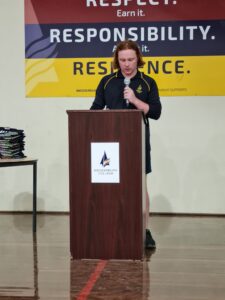Wedderburn College uses the DET Amplify Document to build the voice, agency and leadership of our students. When students are empowered students we enhance their engagement and enrich their participation
Student Voice
Student voice is not simply about giving students the opportunity to communicate ideas and opinions; it is about students having the power to influence change. Authentic student voice provides opportunities for students to collaborate and make decisions with adults around what and how they learn and how their learning is assessed. This is known to lead to improved educational outcomes.
We see this when our students:
- listen to and learn from their peers and adults
- ask questions to strengthen their understanding
- share their ideas and opinions
- actively seek feedback from teachers and peers to progress their learning
- reflect on their learning experience
- give feedback to peers and teachers
- negotiate learning goals and assessment
- respectfully challenge others’ views around learning and teaching
- feel confident to contribute in meaningful ways for a shared sense of ownership

Student Agency
Student agency refers to the level of autonomy and power that a student experiences in the learning environment. Student voice and agency are intrinsically linked. Agency gives students the power to direct and take responsibility for their learning, creating independent and self-regulating learners.
We see this when our students:
- work with teachers in making decisions about teaching and learning
- take responsibility for their learning and are, on the whole, independent and self-regulating learners negotiate and design learning that stretches their thinking
- can track and measure their own learning growth
- are involved in designing and implementing school policy and programs, and actively contribute ideas about student-led learning
- display the capabilities, confidence and willingness to contribute ideas and make decisions about what and how they learn
- reflect, take action and accept the responsibility that comes with being part of the problem solving

Student Leadership
Student leadership is not confined to a small group of individuals, as leadership potential is inherent within all learners. Student leadership includes listening to and being able to clarify the issues of the students they represent and advocating on their behalf. Student leaders have an increased sense of responsibility to help others and to model leadership principles and values. Trust, autonomy and relationships are enhanced through the development of leadership qualities.
We see this when our students:
- set high expectations for themselves and feel motivated and empowered to exercise agency
- have a growth mindset and believe they can learn, and build their knowledge and skills, through effort
- can represent our school and students as confident members of a student leadership team
- generate meaningful discussions on behalf of those students whose voices are less likely to be heard, who are disengaged, or who lack the skills and confidence to express views and opinions
- actively participate in a student representative organisation and effectively contribute to school decision making
- want to learn about themselves, and contribute to the community and the world around them

